Key takeaways:
- Independence fosters personal growth, confidence, and resilience, enabling individuals to tackle challenges and make their own decisions.
- Key barriers to independence include fear of failure, lack of skills, and external pressures, which can hinder personal development.
- Empowering others through active listening, setting goals, and celebrating small achievements cultivates a supportive environment that enhances self-reliance.
- Personal experiences, such as allowing children to make choices and sharing vulnerability, highlight the transformative power of fostering independence in relationships.
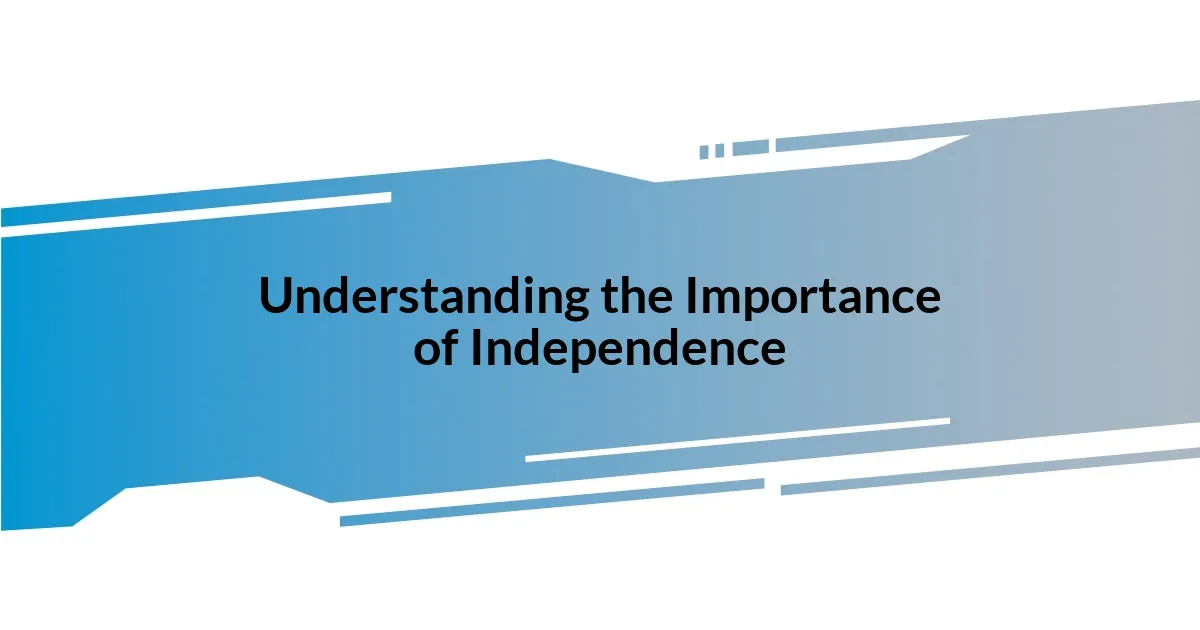
Understanding the Importance of Independence
Independence is a vital pillar in our personal growth. I remember when I first moved out on my own; the initial thrill quickly met waves of uncertainty. The late-night cooking sessions (featuring burnt toast more often than I’d like to admit) were both comical and empowering. It’s moments like these that build resilience and self-reliance, reminding us that we are capable of far more than we often believe.
When we encourage independence, we promote individual thinking and decision-making. Have you ever noticed how a child lights up when they accomplish a task by themselves, like tying their shoes? That sense of achievement fosters confidence, laying the groundwork for tackling future challenges. Independence shapes our ability to take risks, make choices that align with our values, and learn from our mistakes—a key aspect of developing our identity.
Moreover, independence greatly impacts our relationships. I’ve often found that encouraging my friends to pursue their passions independently has strengthened our bond. It allows mutual respect to flourish while each of us grows into our own person. Isn’t it interesting how supporting someone’s independence ultimately deepens our connections? By nurturing independence, we’re not just helping others; we’re enriching our own lives in the process.
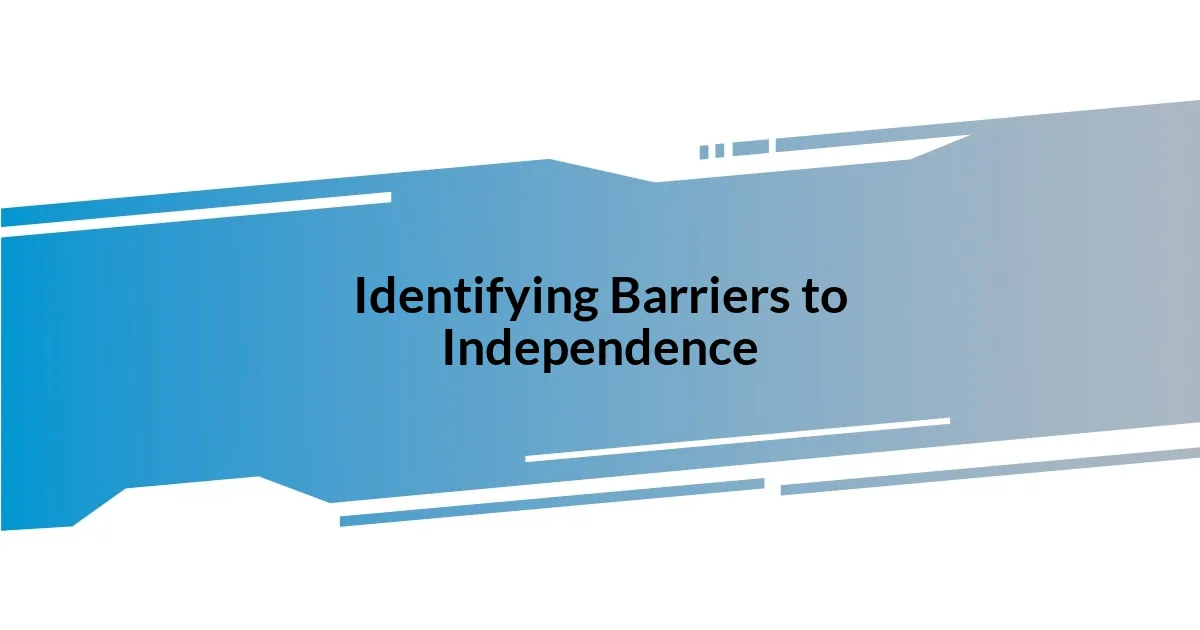
Identifying Barriers to Independence
Identifying barriers to independence can often feel daunting. From my experience, the most significant obstacle is often the fear of failure. I can recall a time when I hesitated to start a new project due to the anxiety that I wouldn’t measure up. This mindset not only stifles growth but also dims the motivation to step out of our comfort zones. Recognizing that fear can hold us back is the first step toward overcoming it.
Another barrier is the lack of skills or knowledge. For instance, I vividly remember how overwhelmed I felt trying to navigate my first grocery shopping trip without a list. The uncertainty of making the right choices can be paralyzing, but it’s crucial to understand that everyone starts somewhere. Building competence takes time and patience, and realizing this can empower us to seek the experiences that foster independence.
Finally, external factors such as societal norms or family expectations can also impede self-sufficiency. I often found that the pressures to conform to specific paths dictated by others left little space for my personal choices. It’s vital to question these external influences, as they can hinder our ability to carve out our journeys and take ownership of our decisions.
| Barrier | Description |
|---|---|
| Fear of Failure | Overcoming anxiety and embracing the possibility of mistakes. |
| Lack of Skills | Recognizing the need for personal growth and building competence. |
| External Pressures | Challenging societal norms to promote personal choice and independence. |
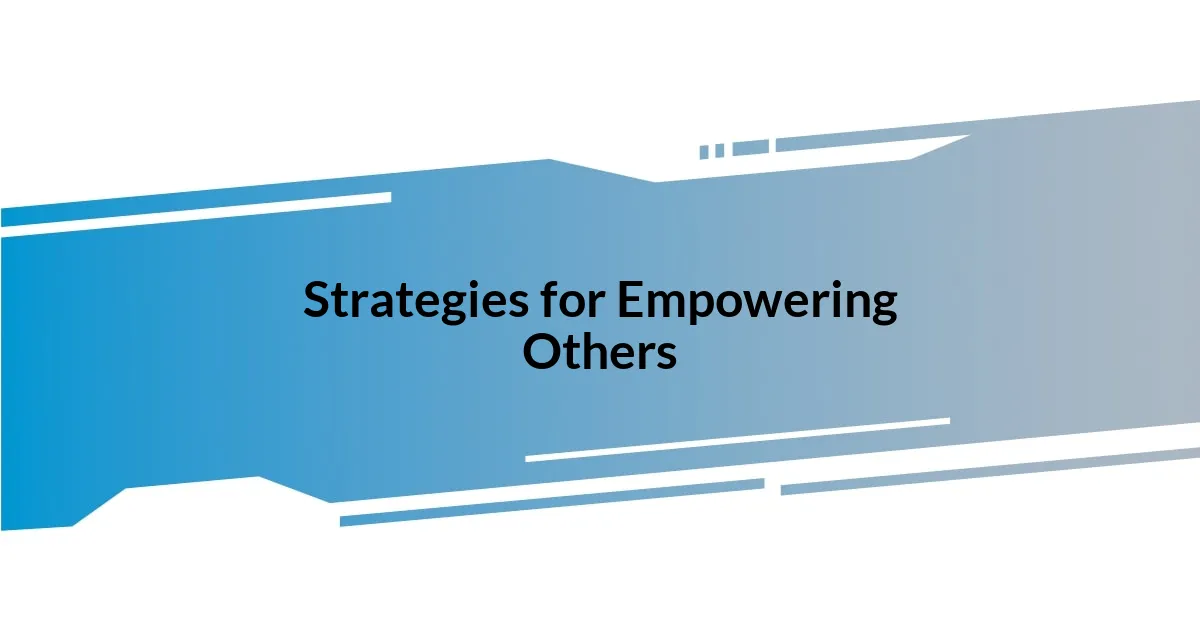
Strategies for Empowering Others
Empowering others can be a transformative experience for both parties. One strategy that has worked for me is to create opportunities for individuals to express their opinions and ideas. I recall a time when I facilitated a group discussion at work. At first, I noticed some hesitation among team members, but as the dialogue progressed, I watched their confidence bloom. Encouraging them to speak up was like bathing a seedling in sunlight—once they felt warmth and support, they began to flourish.
Here are some effective strategies to empower others:
- Active Listening: I find that genuinely listening to someone without interrupting can boost their confidence remarkably. When they feel heard, they’re more likely to share their thoughts freely.
- Setting Goals Together: Collaboratively defining achievable goals can give individuals a sense of ownership over their progress. I’ve paired up with friends to set personal challenges, offering encouragement while letting them steer their journey.
- Celebrating Small Wins: Recognizing achievements, no matter how minor, helps reinforce the behavior. I once surprised a colleague with a small treat for completing a tough task, and it sparked a chain of motivation not just for her but for the whole team.
- Offering Constructive Feedback: Instead of focusing solely on what needs improvement, I always strive to highlight what someone did well and then suggest areas for growth. This approach fosters a sense of safety in learning.
- Modeling Independence: I remember when I took the initiative on a group project, encouraging my teammates to bring their ideas to the table. This hands-on example of independence inspired them to take risks in future tasks.
By implementing these strategies, I’ve seen firsthand how empowering others can turn their apprehension into self-assured action. Each small step creates a ripple effect, encouraging a culture of independence in our interactions.
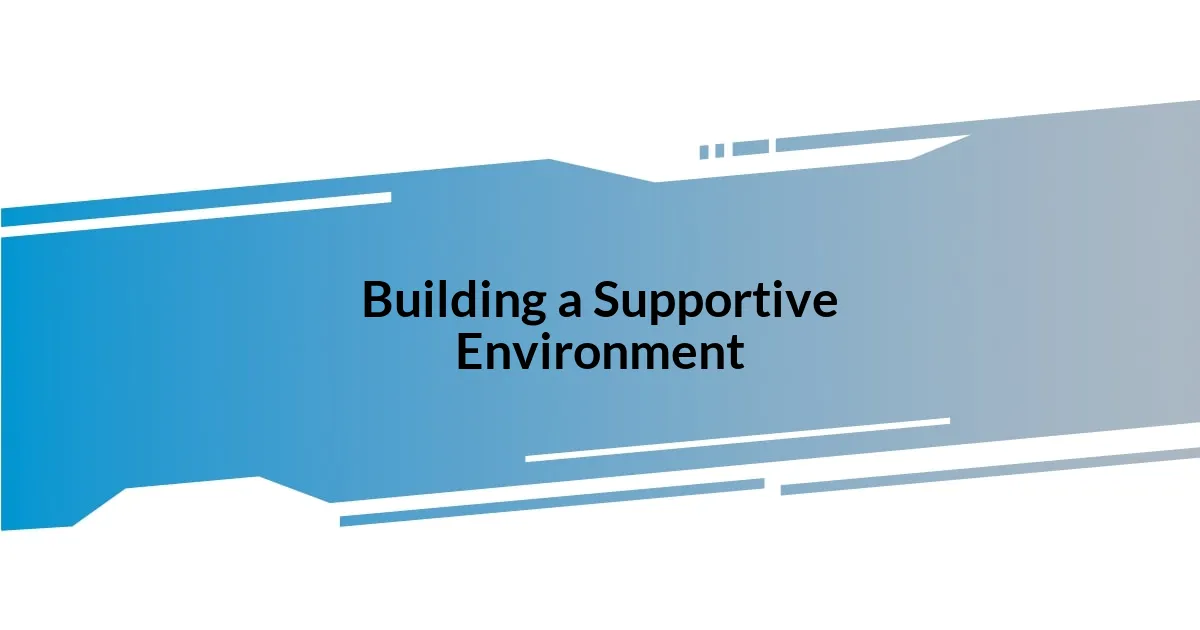
Building a Supportive Environment
Building a supportive environment is all about creating spaces where people feel safe to express themselves. I remember when I helped set up a mentorship program at my workplace. It became a sanctuary where individuals could share their fears and ambitions without judgment. It was heartwarming to witness colleagues support one another, and the transformation in their confidence was palpable.
Creating such an environment also involves recognizing the diverse needs of individuals. I learned this firsthand when I organized a team-building retreat, emphasizing that everyone brings unique backgrounds and skills. It was fascinating to see how some team members thrived in collaborative activities, while others preferred one-on-one discussions. This sparked a realization for me: how can we truly encourage independence if we don’t first cater to the distinct ways people learn and grow?
Lastly, I find that fostering open communication is essential. There was a time when a friend confided in me about her struggles with self-doubt, and just listening made a monumental difference for her. By sharing my own vulnerabilities too, it created a bond of trust. This experience reminded me that vulnerability breeds connection, and when we feel connected, we are more likely to take the leap into independence. Don’t you think that nurturing these connections is vital for personal growth?
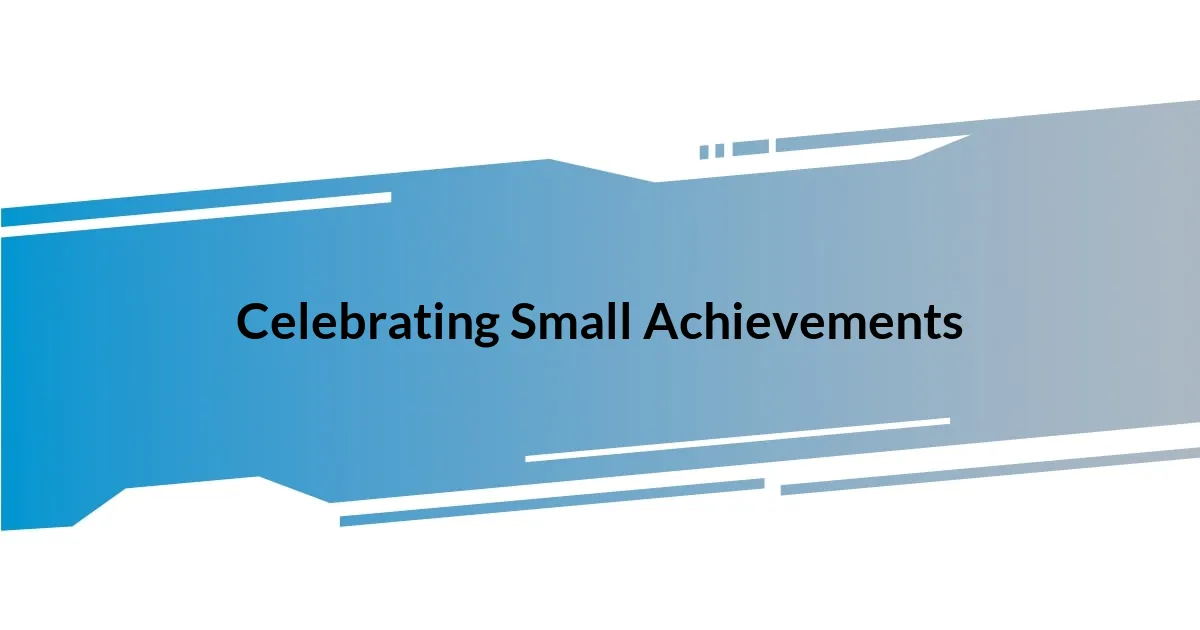
Celebrating Small Achievements
Celebrating small achievements is like planting tiny flags of success along the journey of independence. I distinctly remember the day my daughter tied her shoelaces for the first time all by herself. Rather than just saying, “Good job,” I organized a mini-celebration: a dance party in the living room. Her joy radiated like sunshine; it was a reminder that recognizing small wins not only boosts confidence but also fosters an enduring motivation to tackle greater challenges.
On another occasion, one of my students finally presented his project, something he had been anxious about for weeks. We took a moment to acknowledge his courage—not just with applause, but by sharing our own struggles with public speaking. This connection turned his anxiety into exhilaration, highlighting how celebrating minor achievements can transform trepidation into triumph. Isn’t it fascinating how a little recognition can turn nerves into newfound bravery?
In my experience, celebrating small victories also encourages a sense of community. I once participated in a local running club where we shared our progress weekly. Each runner’s improvement, no matter how small, was celebrated with enthusiastic cheers. This camaraderie turned the individual journey into a shared adventure, reinforcing how reaching tiny milestones cultivates not just personal growth but also collective support. How can we underestimate the power of celebration when it serves as a foundation for both individual and communal empowerment?

Sharing My Personal Experiences
Sharing my personal experiences in encouraging independence has been both enlightening and rewarding. I remember a time when I decided to let my son choose his own clothes for school. Initially, I felt anxious as I watched him mix stripes with polka dots, thinking, “Is he really going to wear that?” But in seeing his excitement and independence blossom, I learned that letting go of control can be one of the most empowering gifts we give. It transformed our morning routine into a joyful experience, where he felt trusted and confident in his decisions.
Another memorable experience occurred during my volunteer work with teens at a community center. One of the participants struggled with decision-making and always relied on others for guidance. I encouraged her to tackle a small project on her own—a simple event to showcase their talents. The glow on her face after successfully planning it was priceless! It struck me that independence often sprouts from the tiniest choices. When we empower others to navigate their paths, we cultivate a sense of pride that fuels their desire to venture further. Isn’t it inspiring to witness someone discover their own capabilities through such seemingly small steps?
Lastly, I’ve seen firsthand how my experience as a mentor can shift someone’s perspective. One mentee was hesitant to pursue a job opportunity, fearing rejection. I shared my own story of facing rejection in my early career. It wasn’t easy, but with each setback, I learned resilience. When he landed the job after our talk, the light in his eyes was a reminder of why I’m passionate about encouraging independence. I often think—how many potential successes are buried beneath layers of doubt? By sharing our journeys, we illuminate a path of possibility for others to follow.
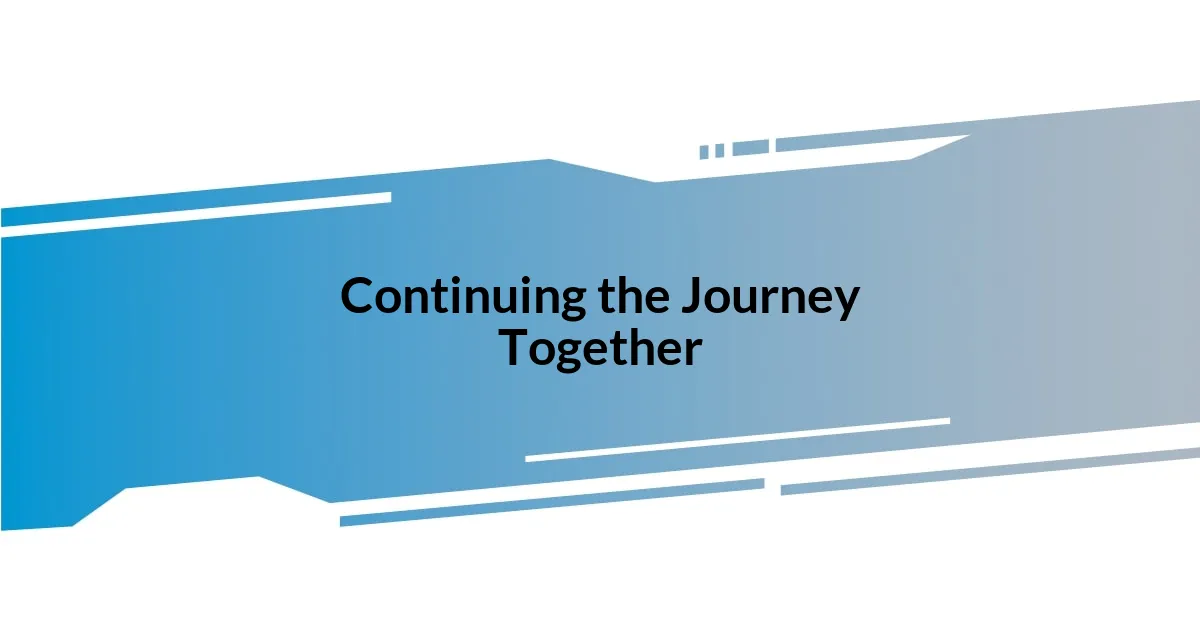
Continuing the Journey Together
Continuing the journey of encouraging independence is about partnership and shared experiences. I recall a family camping trip where my youngest insisted on setting up her own tent. As I watched her wrestle with the fabric and poles, my heart raced. Part of me wanted to jump in and help, but I held back. When she finally figured it out, the pride in her eyes was priceless. That moment reinforced my belief that learning often happens when we step back and allow others to forge their own paths. Isn’t it incredible how these small acts of independence can reshape our relationships?
In another instance, during our weekly family game night, I observed how my children were coming up with their own game rules. I could have easily dismissed their imaginative changes, but instead, I embraced their creativity. It turned into a heartfelt discussion about fairness and teamwork, allowing them to express their thoughts and collaborate. Watching them navigate this led to unexpected laughter and bonding. Have you ever realized that sometimes, the best lessons come not from traditional teaching but from playful interactions?
As we continue these journeys together, I’ve seen how supportive communication plays a crucial role. I remember a time when my neighbor’s daughter was struggling to approach her classmates. We organized a community art project where she could lead without pressure. By guiding her through this experience, I witnessed a transformation—she found her voice among her peers. The smiles exchanged during that project reminded me that we’re all in this together, fostering independence one connection at a time. Isn’t it heartwarming to realize that collaboration fuels growth for everyone involved?